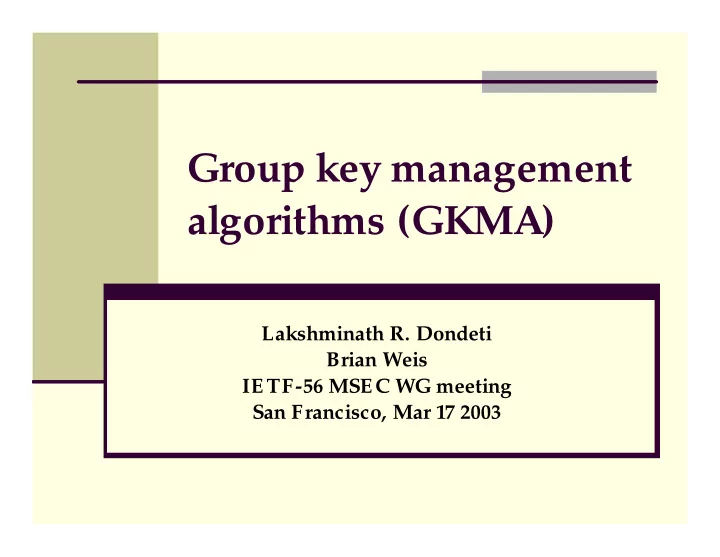

Group key management algorithms (GKMA) Lakshminath R. Dondeti Brian Weis IE TF-56 MSEC WG meeting San Francisco, Mar 17 2003
Introduction � Group key management architecture � Group key management protocols � GDOI, GSAKMP, MIKEY � Group key management algorithms � LKH, OFT, OFC, MARKS, Subset diff etc. March 17, 2003 IETF-56, San Francisco MSEC WG meeting 2
Group key management algorithms � LKH, OFT, OFC (stateful): expired I-Ds � LKH is an informational RFC � Subset difference (stateless): expired I-Ds � MARKS: expired I-D � GSAKMP and GDOI include support for LKH � Allow extensions to support other GKMAs March 17, 2003 IETF-56, San Francisco MSEC WG meeting 3
GKMA standardization � LKH, OFT and OFC use similar logical trees � One RFC may cover this � Consider immediate as well as batch rekeying � Brian and Lakshminath working on an I-D ☺ � Previous efforts by David McGrew and Lakshminath � Group key transport protocol (GKTP) � Subset difference? MARKS? � Any known efforts to standardize these? March 17, 2003 IETF-56, San Francisco MSEC WG meeting 4
Group key transport protocol � GKTP � Rekey and feedback messages � Rekey messages are part of GKM arch I-D � Feedback messages are covered in a separate I-D � New I-D submitted by Lakshminath and Thomas � Key tree management � Key tree encoding March 17, 2003 IETF-56, San Francisco MSEC WG meeting 5
Key tree management � Key trees � may grow and shrink with membership changes � Fixed-size trees � Do we need to include node ID changes? � Yes � No (implicit in key changes) � Several known key tree encoding schemes � Binary number encoding � Natural number encoding (works for d > 2) March 17, 2003 IETF-56, San Francisco MSEC WG meeting 6
Binary encoding 0 1 00 01 10 11 March 17, 2003 IETF-56, San Francisco MSEC WG meeting 7
Natural number encoding of key trees 1 2 3 4 5 6 7 March 17, 2003 IETF-56, San Francisco MSEC WG meeting 8
After two joins and member 7’s departure 1 2 3 4 5 6 7 8 9 March 17, 2003 IETF-56, San Francisco MSEC WG meeting 9
Key tree management � In the previous schemes, tree grows � by splitting a leaf node � split an internal node or the root node itself � Tree shrinking occurs � Only if the highest numbered node has departed � Next member to join receives position “7” � Node number update messages may be sent in or along with rekey messages March 17, 2003 IETF-56, San Francisco MSEC WG meeting 10
Encoding proposed by Zhang et. al. � Natural number encoding � {k j }k i is identified with the ID of k i � Assuming k j is k i ’s parent � Too simplistic for OFT � The key tree is always full and balanced � Null nodes are introduced to make it so � Joins and leaves may change the leaf-node IDs � Members can determine their new ID using old ID and the max internal key node ID. March 17, 2003 IETF-56, San Francisco MSEC WG meeting 11
Rekey messages � Send the max. internal key node ID in rekey messages � Works for immediate and batch rekeying � Might not work for OFT? March 17, 2003 IETF-56, San Francisco MSEC WG meeting 12
Next steps: Option 1 � Standardized key tree encoding � Try to design a scheme that works for LKH/ OFT/ OFC etc. � Don’t send key node ID changes in rekey messages � Keep the trees as efficient as possible � No static trees! � Static trees inefficient if instantaneous membership size is typically smaller than subscription base March 17, 2003 IETF-56, San Francisco MSEC WG meeting 13
Next steps: Option 2 � GCKS may advertise a standardized scheme and use it � Tradeoffs in footprint, communication cost etc., � This stems from different people having different ideas in key tree management � But we will make them publish a standards RFC before they can use a “scheme” � What do other people think? March 17, 2003 IETF-56, San Francisco MSEC WG meeting 14
Recommend
More recommend